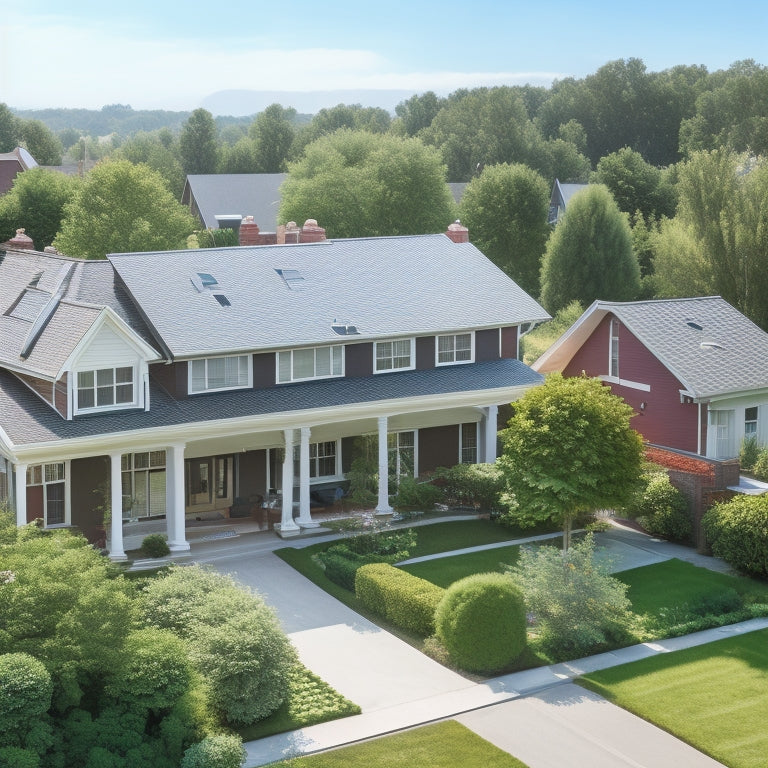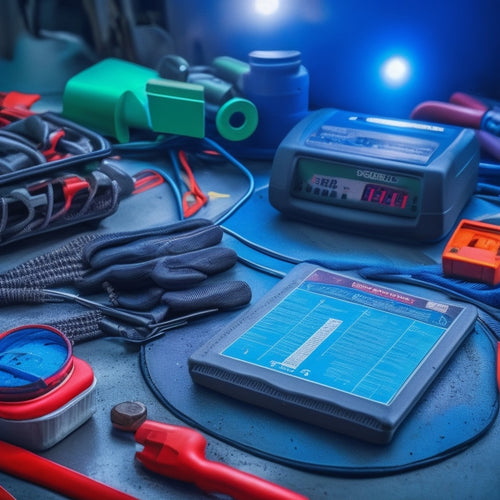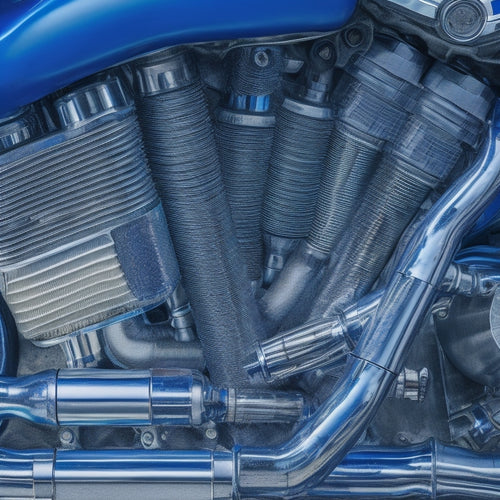
Estimate Your Residential Solar Panel Installation Cost
Share
You're wondering how much your residential solar panel installation will cost. The total cost depends on several factors, including your roof's size and complexity, the quality and efficiency of the solar panels and inverters, the installation company's reputation and labor costs, and local incentives and rebates. The more complex your roof, the more panels you'll need, and the higher the cost. Higher-efficiency panels and premium brands like SunPower and LG also impact the cost. As you explore your options, you'll discover how these factors intersect to determine your total installation cost, and how you can maximize your investment.
Key Takeaways
• Total installation cost is affected by factors like system size, panel efficiency, roof complexity, and local incentives.
• Roof size and orientation impact the number of panels needed, with south-facing roofs receiving the most sunlight.
• Higher-efficiency panels from premium brands like SunPower and Panasonic may be more expensive upfront but offer long-term savings.
• Installation company reputation, workmanship, and warranties also influence the overall cost and quality of the installation.
• Local permits and inspection fees, which vary by location, should be factored into the total installation cost estimate.
Understanding Solar Panel Costs
When considering installing solar panels, one of the most crucial aspects to grasp is the overall cost, which is comprised of several components that add up to the total price tag. The cost of solar panels has decreased markedly over the years, thanks to advancements in technology and growing demand, which has led to a decline in prices. According to recent solar industry trends, the average cost of solar panels has dropped by over 70% in the last decade. This downward trend is expected to continue, making solar energy more accessible and affordable for homeowners.
To get an accurate estimate of your solar panel installation cost, having a good understanding of the various components that contribute to the total cost is important. These include the cost of the solar panels themselves, inverters, mounting hardware, and installation labor costs.
Additionally, you should consider financial projections, such as the expected savings on your energy bills and any potential incentives or tax credits. By understanding these components and their associated costs, you'll be better equipped to make an informed decision about investing in solar energy for your home.
Roof Size and Complexity
When you get ready to install solar panels on your roof, you'll need to take into account the size and complexity of your roof, since these factors greatly affect the overall cost and efficiency of your solar panel system.
A larger roof requires more solar panels, which increases the cost. On the other hand, a smaller roof may not be able to accommodate as many panels, reducing the system's overall efficiency.
Roof orientation is also vital, as it affects the amount of sunlight your solar panels receive. A south-facing roof is ideal, as it receives the most direct sunlight. However, if your roof has multiple orientations, it may require more complex installation and additional hardware, increasing the cost.
Roof obstacles, such as skylights, vents, and chimneys, can also impact the installation process. These obstacles may require special mounting systems or additional labor, adding to the overall cost.
Understanding the intricacies of your roof will help you better estimate the cost of your solar panel installation and ensure a successful project.
System Size and Efficiency
When considering a residential solar panel installation, you'll need to think about the system's size and efficiency.
You'll want to evaluate panel efficiency ratings, which range from 15% to over 20%, and consider system sizing factors like your energy needs and available roof space.
Panel Efficiency Ratings
Your solar panel installation's overall efficiency relies heavily on the efficiency ratings of the individual panels, which are measured by their ability to convert sunlight into electricity, with higher efficiency ratings generally resulting in smaller system sizes.
As you explore your options, it's important to take into account the panel efficiency ratings to guarantee you get the most out of your investment.
Here are some key factors that affect panel efficiency ratings:
-
Cell temperature: High temperatures can reduce a panel's efficiency, so it's vital to choose panels with high temperature coefficients.
-
Energy throughput: A panel's energy throughput affects its overall efficiency, with higher throughput resulting in more energy generated.
-
Panel material: The type of material used in the panels, such as monocrystalline or polycrystalline silicon, impacts efficiency ratings.
- Manufacturing quality: The quality of the manufacturing process also plays a significant role in determining a panel's efficiency rating.
System Sizing Factors
As you consider panel efficiency ratings, you'll also need to think about the overall system size and efficiency, which will impact the number of panels required to meet your energy needs. This is where system sizing factors come into play. Your solar panel professional will conduct load calculations to determine your home's energy requirements, taking into account factors like your energy usage patterns, roof size, and local building codes. This information is used to determine the best system size and configuration.
Shading analysis is also essential in determining the system size. Shading from trees, buildings, or other obstructions can greatly reduce your system's energy output. By evaluating the shading patterns on your roof, your installer can determine the most suitable panel placement to minimize energy losses.
Energy Output Capacity
The energy output capacity of a residential solar panel system, measured in watts (W), determines how much electricity it can produce, and it's directly tied to the system's size and efficiency.
When estimating the installation cost, it's crucial to take into account the system's energy output capacity, as it greatly impacts the overall cost.
Here are some key factors to take into account when evaluating energy output capacity:
- System size: A larger system size means more panels, which increases the overall energy output capacity.
- Panel efficiency: Higher-efficiency panels produce more electricity per hour of sunlight, increasing the system's energy output capacity.
- Wattage calculations: Accurate wattage calculations make sure you're getting the right system size for your energy needs.
- Power optimization: Optimizing your system's power output through techniques like maximum power point tracking (MPPT) can boost energy production.
Panel Quality and Brand
When it comes to choosing the right solar panels for your residential installation, you'll want to think about the quality and brand of the panels. Tier 1 solar panels, which are manufactured by reputable companies, offer high-quality products with better performance and durability.
Premium brand options, such as SunPower and Panasonic, are known for their high-efficiency panels and extensive warranties.
Tier 1 Solar Panels
You'll likely come across Tier 1 solar panels from reputable brands like SunPower, Panasonic, and LG, which boast high-quality components and exceptional durability. These top-tier panels are built to last, with a focus on sustainable manufacturing processes that minimize environmental impact.
When investing in Tier 1 solar panels, you can expect:
-
Higher efficiency ratings: Tier 1 panels often have higher efficiency ratings, converting more sunlight into usable energy.
-
Longer warranty coverage: Reputable brands typically offer longer warranty periods, providing peace of mind and protecting your investment.
-
Environmental benefits: By choosing Tier 1 solar panels, you're supporting manufacturers committed to reducing their carbon footprint and promoting eco-friendly practices.
- Industry standards compliance: Tier 1 panels meet or exceed industry standards for quality, ensuring you get a reliable and efficient solar energy system.
Premium Brand Options
Premium brands like SunPower, Panasonic, and LG offer high-efficiency solar panels with advanced features, setting them apart from more affordable options. These premium brands provide you with excellent performance, backed by industry-leading warranties. You'll benefit from higher energy yields, even in low-light conditions, and enjoy a faster return on investment.
When you opt for premium brands, you're not only getting high-quality panels but also luxury features that elevate your solar installation. Expect sleek, high-end aesthetics that complement your home's design. These brands often offer customizable frames, sleek designs, and premium materials that blend seamlessly with your roof.
With premium brands, you'll experience the latest innovations in solar technology, such as bifacial panels, PERC cells, and advanced inverters. These cutting-edge features ensure optimal energy harvesting, increased durability, and reduced maintenance.
Although premium brands come at a higher upfront cost, they provide long-term savings, enhanced performance, and a superior ownership experience. If you're looking for the best, consider investing in premium brand options for your residential solar panel installation.
Installation Company and Labor
The installation company and labor costs account for a significant portion of the overall residential solar panel installation cost, ranging from 10% to 20% of the total expense. As you consider your solar panel installation, it's important to evaluate the installation company and labor costs to make sure you're getting a quality installation at a fair price.
When choosing an installation company, consider the following factors:
-
Company reputation: Research the company's reputation online, checking reviews and ratings from previous customers.
-
Crew experience: Confirm the installation crew has the necessary experience and training to handle your project.
-
Workmanship warranty: Look for companies that offer a thorough workmanship warranty to protect your investment.
- Safety record: Verify the company's safety record, as a safe working environment is vital for a successful installation.
Local Incentives and Rebates
Local governments and utilities often offer incentives and rebates that can greatly reduce your upfront solar panel installation cost. It's important to explore these opportunities in your area. You may be eligible for state credits, which can provide a substantial reduction in your tax liability.
Additionally, utility companies may offer discounts on your electricity bill or provide rebates for installing solar panels. Government grants can also help offset the cost of your solar panel installation. Municipal programs may offer special financing options or property tax exemptions for homeowners who invest in solar energy.
It's crucial to research and take advantage of these local incentives and rebates to minimize your out-of-pocket expenses. By doing so, you can significantly reduce the overall cost of your solar panel installation and start generating clean energy sooner. Be sure to check with your local government and utility company to see what incentives are available in your area.
Battery Backup and Storage
You'll likely want to think about incorporating a battery backup and storage system into your residential solar panel installation to guarantee a steady supply of electricity during power outages and grid failures. This is especially important if you're looking to increase your energy security and independence from the grid.
With a battery backup system, you can store excess energy generated by your solar panels during the day for use at night or during power outages.
Here are some benefits of incorporating a battery backup and storage system into your residential solar panel installation:
-
Deep Cycle batteries provide reliable backup power, ensuring your home remains powered during grid outages
-
Grid Services integration allows you to sell excess energy back to the grid and offset your energy costs
-
Energy Security is enhanced with a battery backup system, providing peace of mind during power outages
- Home Automation and Smart Homes capabilities can be integrated with your battery backup system for seamless energy management
Permits and Inspection Fees
When planning your residential solar panel installation, you'll need to take into account permits and inspection fees, which can add up quickly and impact your overall project budget. These costs vary depending on your location, as municipal regulations and local ordinances dictate the necessary permits and inspections required for a solar panel installation.
On average, you can expect to pay between $500 to $2,000 in permits and inspection fees, although this amount can be higher or lower depending on your location and the complexity of your project.
In addition to the permits themselves, you'll also need to factor in the cost of inspections, which can range from $100 to $500 per inspection. It's vital to work with a reputable solar panel installer who's familiar with local regulations and can guide you through the permitting process.
They can help you navigate the necessary permits and inspections, ensuring your project meets all local ordinances and regulations. By taking into account permits and inspection fees, you can get a more accurate estimate of your overall project cost and avoid unexpected expenses down the line.
Frequently Asked Questions
Can I Install Solar Panels on a Metal or Clay Tile Roof?
You can install solar panels on a metal or clay tile roof, but verify the roof's durability and tile compatibility to support the added weight and secure mounting of panels, guaranteeing a safe and efficient installation.
Do I Need to Replace My Roof Before Installing Solar Panels?
"Ha! You think solar panels are the only thing holding you back from saving the planet? Newsflash: your roof might be the real villain. Before installing, get a roof inspection to assess its age, condition, and warranty - don't let maintenance woes sabotage your eco-dreams."
Can I Install Solar Panels on a Rented Property?
You'll need to obtain your landlord's approval before installing solar panels on a rented property, as it's typically specified in rental contracts, so make sure you get their consent to avoid any potential disputes.
How Do I Ensure My Solar Panels Are Animal Proof?
Like a master conductor, you're orchestrating a harmonious coexistence between your solar panels and wildlife. To guarantee your system remains animal-proof, install wildlife deterrents, such as bird-repellent balloons or ultrasonic pest control devices, to keep unwanted critters at bay.
Can I Install Solar Panels on a Property With Multiple Owners?
When contemplating solar panels on a property with multiple owners, you'll need to navigate property laws and co-owner agreements to make certain all parties are on board with the installation, avoiding potential disputes down the line.
Related Posts
-

5 Essential Car Battery Maintenance Tips
You can extend your car battery's lifespan and prevent unexpected breakdowns by following five essential maintenance ...
-

Why Eco-Friendly Rides Are the Future of Commuting
As you seek alternatives to traditional vehicles, you'll find eco-friendly rides are not only convenient and cost-eff...
-

3 Ways to Increase Motorcycle Horsepower
You're about to unleash your motorcycle's hidden power by exploiting three key areas. First, upgrade your electric mo...


